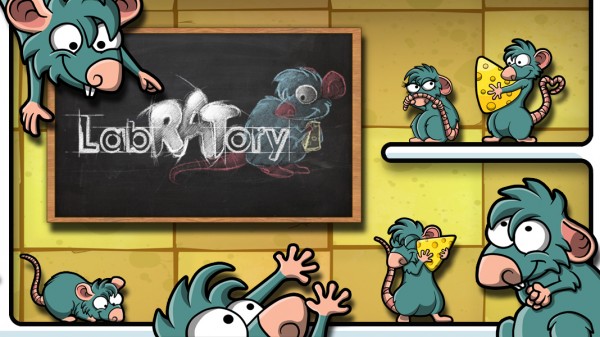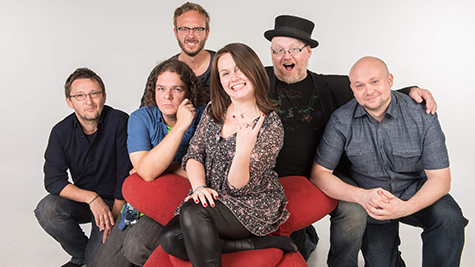Storm Bringer Studios is a world-renowned company that made a revolution in the game industry in early 2000s of the 21st century, the founder and CEO Irakli Kokhrashvili recalls, meaning their first IP, the hit game of Steameria:Tournament.
Successful Titles in the Past Don’t Make a Company Fail-Proof
It may have never happened if we didn’t participate in the GameFounders program in Estonia in 2013. When we came to Tallinn in December 2013, we had very little experience in pitching and presenting ourselves, and got pretty frustrated after the first few sessions with the mentors. At that time, we were pitching some mobile game prototypes that we made a few weeks earlier, like Flower Power, a direct clone of King’s Candy Crush Saga.
I still remember how miserable we felt in the first few weeks. Our pitches were terrible, so we started thinking about what we’re doing wrong. We asked ourselves: why are we now making games this unsuccessful? We’ve got history! We got used to making big and complex titles for more than 3.5 years. We were creating console games like GeoPolice 1 and GeoPolice 2, first and third person shooters. We did outsource for Microsoft, Kixeye, and Larva Game Studios. The shooters got millions of downloads worldwide. I will never forget that feeling when in 2011, I first saw the DVD with the game our team was working hard on, GeoPolice 1. It was time to make The Decision about our next games, and eventually, we headed back to Georgia and had a long meeting with the rest of team.
Another Shooter, in a Steampunk World This Time
This was the turning point for us, an experienced team of 25 professionals. We finally decided to make another shooter using the Unreal engine. Now everything fit well, we ALL got organized and had a clear goal. The clock started ticking. We needed to make one fully polished level based on assets from Police 3, our game that was 90 percent finished but never released. Meanwhile, at GameFounders, we had to think out a concept of our own commercial title. Having researched the shooter market, we decided not to make just another realistic shooter but instead go for alternate reality, the steampunk world of Steameria. Steameria:Tournament was the first title in this universe. Later, we released several other games in the same world, but this is now all a part of history.
The first thing we learned during the GameFounders program was that game development is a hard and competitive business. To sell a game, you need a solid business model - the most popular model at that time was free-to-play plus in-app purchases.
Ok, we said, we can make a free-to-play online steampunk shooter, with 12 unique characters with their own backstory and motives. The game will feel like Quake III Arena meets Mortal Kombat. We’ve done an online shooter in past, so were able to create more, but we’re a startup company that needs to experiment and try new and innovative things. This time, we decided to support Oculus Rift VR and ordered the devkit. I personally was very skeptical at first. We had experience with VR devices in the past. They were big and not so impressive, and I had no idea of how this one could be different. Back then, most people were still using common flat PC screens (!). Having tried the new VR kit, we were shocked! Feeling everything physically and reacting to it naturally looked like the next big thing we surely needed to support and optimize our game for it.
Skilled Players Can Earn Real Money
We decided to allow skilled players to earn money. For example, when a gladiator reaches level 40 in Steameria:Tournament, he can challenge another gladiator of the same level, with an equal weapons and armor set, in the same Arena, bet real money, and have a series of duels. The winner gets money as the prize. Each player pays to enter a tournament ($1, $3, $5, $10), and the winner gets it all. This is now quite popular on mobiles with skill-based gameplay. We’ve partnered with Cashplay and are using its solution in three of our mobile games already.
This idea was later developed much more: we did an extension and free DLCs in a year after launching the game. The extension added a partner mobile application for all major platforms that allowed mobile players to login, see live statistics, and bet on Steamerian gladiators!
We’ve finally mastered pitching and which words to choose for that, all thanks to numerous mentors’ sessions we had almost every day at GameFounders. There were some mentors that we called “nicers”. They came, we talked, they said - “oh that’s nice, keep working guys” - and left, and we never heard about them anymore. On the other hand, there were a few mentors who almost insulted us at first meetings.
We didn’t understand their motives at first, but soon realized that those were real mentors, the ones who cared. We partnered with them later and understood that connections are everything in this industry!
We were ready and fully motivated to enter the cruel world of game development by that time. We attended Slush 2013, had Demo Days in San Francisco and Game Connection Paris 2013, visited Sony, Facebook, Microsoft, Zynga, Funorama, Google, and met iconic people of game industry. We’ll never forget how we met EPIC’s VP, Mark Rein in a game event at Helsinki, or how we talked to Robin Hunicke and absolutely loved her vision and company.
This helped us realize one very important thing: people who work for those companies are not demigods, they are talented workers who think and talk almost the same as you. Maybe this doesn’t mean much for other companies, but it was almost everything for us. Being the first game development company in Georgia was hard. We were pioneers. Not a single person understood why we were doing this at that time. Nevertheless, we have confidence about our goals.
As for now, Steameria: Tournament is still being made, but very slowly, since the developers have switched to mobile games for now and are still looking for an investor for the big game of Steameria. They’ve released 10 mobile games in 3.5 month on iOS, ported 8 titles on Android and 10 on Windows phone.









